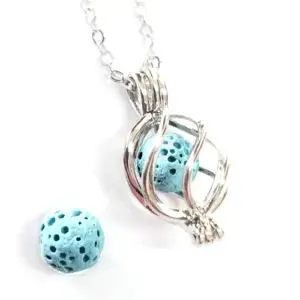Is it possible to get an allergic reaction from essential oils?
Indeed, it is possible.
Even the purest, highest quality essential oil brands can cause skin rashes and other reactions, due to skin sensitivity or certain allergy conditions.
A high quality oil does not include any synthetic fillers. Using a good brand decreases the chances that you will suffer from a reaction. That being said, essential oils are very concentrated. Therefore, they can induce either delayed or instant hypersensitive reactions for certain people.
[amazon box=”B01161IL20″]
Essential Oil Skin Reactions
There are three types of skin reactions essential oils can induce:
1. General irritation
Irritation from essential oils can come on quickly, sometimes within seconds of exposure. It is typically a non-allergic reaction, prompting a burning sensation.
This irritation is most common with “heat oils” such as clove, thyme, and oregano. To curb this kind of reaction, apply a carrier oil (like jojoba or coconut oil) and then massage the area with warm water and soap.
2. Skin sensitivity
Unlike the burning sensation that arrives from general irritation, “sensitization” is a form of reaction that develops over time. The first time you are exposed to a particular oil, there may not be a reaction.
However, over time (anywhere from days to months), hives or rashes can surface on the skin. Risks can be increased by genetics, eczema, stress, using certain medications, and more.
3. Photosensitivity
Photosensitivity can stem from components in the skin, UV photons, and the oil itself. Some reactions can be more severe than others, ranging from slight discoloration of the skin to a blistering burn.
These photosensitivities can be delayed, peaking at 36 to 72 hours following UV exposure. The most common culprits are citrus oils like orange and lemon. If you suffer from photosensitivity, avoid exposure to UV light for about 12 hours following application.
[amazon box=”B06XRLR9RQ”]
How to Avoid Allergic and Sensitivity Reactions
While a small minority of people will inevitably struggle with essential oil reactions, there are many ways to avoid the symptoms. To keep things simple, here is a list of ideas for prevention:
- The most important way to avoid skin reactions is to dilute the oil when applied topically. You can do so with grapeseed oil, jojoba, olive oil, and coconut oil.
- If irritation, itching, or a rash surfaces, halt using essential oils until the issue clears up.
- If you suffer from photosensitivity, only apply the oils when you will be inside for several hours.
- If, regardless of the precautions you take, you develop reactions, then exclusively use a diffuser to “apply” your essential oils.
- Don’t forget to screw on the caps of your essential oil bottles immediately after use (this will safeguard the oil from oxidation)
- Store your oils in small amber glass bottles and keep them away from heat.
- Maintain a healthy diet and have supplements on hand that ensure a favorable antioxidant status.
- Don’t apply essential oils topically in conjunction with cosmetics or other chemical products.
- Do not apply to areas of the skin that are inflamed or damaged.
- Look at the ingredients of any medications you take (prescription or over-the-counter) to see if it could cause an allergic reaction.
Diffusing Essential Oils
 If none of the strategies above work, there are other ways to apply essential oils. If you are already an essential oil user, most likely you already have a diffuser.
If none of the strategies above work, there are other ways to apply essential oils. If you are already an essential oil user, most likely you already have a diffuser.
Diffusing is one of the most popular applications. By mixing a few drops of oil with water in a diffuser, you can enjoy the therapeutic benefits of essential oils for hours on end.
At work, and need an afternoon pick-me-up? Diffuse a few drops of orange and peppermint in your office.
Having trouble sleeping? Diffuse some lavender in your bedroom.
Have a foul odor you can’t seem to get rid of? Diffuse some lemon in your living room.
And on and on…
[amazon box=”B0128HRZOG”]
Portable Diffuser Accessories
 Traditional diffusers have limitations. After all, they are stationary. If you’re out and about, and you don’t want to apply your oils topically, then you’re stuck.
Traditional diffusers have limitations. After all, they are stationary. If you’re out and about, and you don’t want to apply your oils topically, then you’re stuck.
Well, there is a solution: Portable essential oil accessories.
Depending on the type of portable diffuser you use, there is jewelry that can hold a scent for a few hours up to a couple of days.
For instance, the porous makeup of lava stones can maintain a consistent aroma for days at a time (depending on the oil). Apply two drops to the stone, place it in the necklace or bracelet locket, and you’re good to go.
If you have skin sensitivity, or if you want to diffuse oils in style and on the go, these products are the ideal solution.


